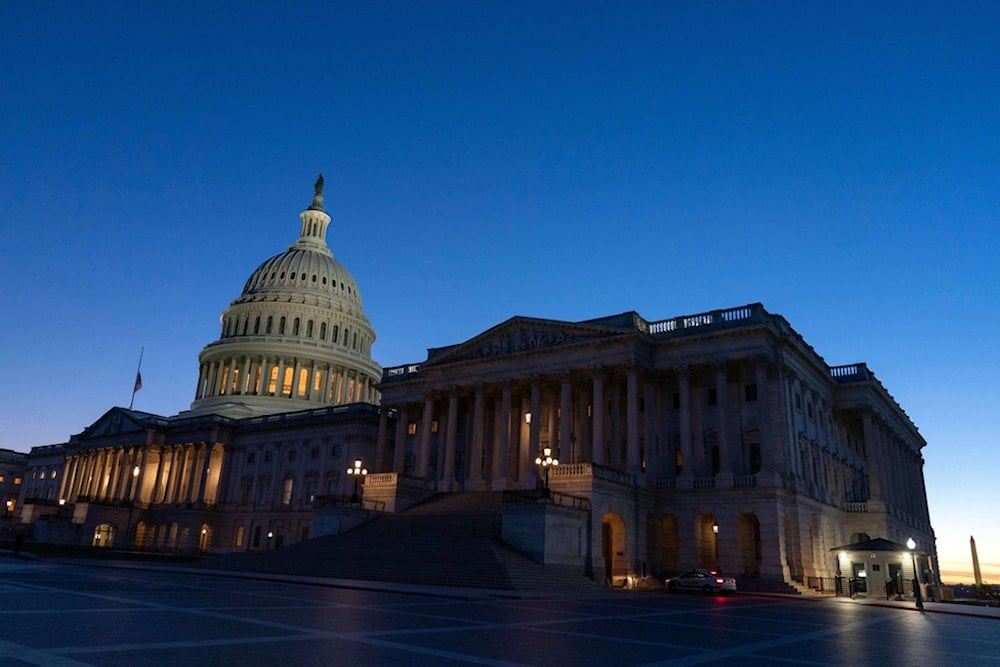US shutdown deal allows Republicans to sue for $500K in Jan 6 damages
A Senate bill to reopen the US government has ignited backlash for including a clause, backed by Republican lawmakers, that allows senators to sue for $500,000 in damages over Justice Department phone data seizures linked to the January 6 probe.
-

The US Capitol is seen at sunset a day before the House prepares to vote on a bill to reopen the government at the Capitol in Washington, Tuesday, November 11, 2025. (AP Photo/Jose Luis Magana)
Legislation aimed at reopening the US government after its longest shutdown in history has sparked controversy for containing a clause that could financially benefit several Republican lawmakers whose phone records were seized during the Justice Department’s investigation into the January 6, 2021, Capitol attack.
The bill, passed by the Senate on Monday, would make it unlawful, retroactively in most cases, for federal authorities to obtain a senator’s phone data without prior disclosure. It grants those affected the right to file lawsuits against the Justice Department, seeking $500,000 per violation in damages, plus legal fees and related costs. The Justice Department could choose to settle such claims rather than litigate them.
Senators seeking 'justice'
The provision, championed by Senate Republican Whip John Thune, applies retroactively to January 2022, a timeframe that directly overlaps with the Justice Department’s collection of senators’ phone metadata during Special Counsel Jack Smith’s investigation. It also requires telecommunications companies to notify senators and the Senate Sergeant-at-Arms whenever their phone data is subpoenaed, unless the senator is the target of a criminal investigation, in which case notice may be delayed for 60 days.
Among the lawmakers eligible to sue are Republican Senators Marsha Blackburn, Lindsey Graham, Bill Hagerty, Josh Hawley, Dan Sullivan, Tommy Tuberville, Ron Johnson, and Cynthia Lummis, all of whom voted in favor of the legislation.
"We will not rest until justice is served and those who were involved in this weaponization of government are held accountable," said Blackburn, whose records were among those obtained
Read more: Trump pardons Giuliani, allies in 2020 election interference case
Republicans have alleged that the FBI’s seizure of toll records, logs of calls and texts, rather than content, represented an unprecedented intrusion by the executive branch. Senator Chuck Grassley earlier accused the Biden administration of "spying on lawmakers," describing it as "arguably worse than Watergate." Smith’s team, however, maintained that the data collection was lawful and conducted under established procedures.
Democrats sharply criticized the measure, accusing Republicans of inserting self-serving provisions into an essential funding bill. "Not a cent for health care, but Republicans wrote in a corrupt cash bonus of at least $500k each," Senator Patty Murray wrote on social media.
So apparently, they CAN insert policy issues outside of government funding as long as it means Republicans get a giant payout from the American taxpayer?
— Senator Patty Murray (@PattyMurray) November 11, 2025
Not a cent for health care, but Republicans wrote in a corrupt cash bonus of at least $500k each for 8 GOP Senators. 📜💰🤷♀️ https://t.co/V6ysB0or8W
Justice Deferred Again
The disputed records were subpoenaed as part of Special Counsel Jack Smith’s probe into President Donald Trump’s efforts to overturn the 2020 election results. Investigators examined communications in the days surrounding January 6, 2021, when pro-Trump rioters stormed the Capitol to disrupt the certification of Joe Biden’s electoral victory. Though Trump was charged, the case never reached trial due to legal delays. Smith ultimately dropped the case following Trump’s 2024 election victory, citing the Justice Department’s policy against prosecuting a sitting president. In his final report, Smith asserted that the evidence gathered would likely have led to a conviction had the case proceeded.
Lawmakers have since demanded that major telecommunications companies, including AT&T, Verizon, and T-Mobile, disclose the extent of data they handed over to investigators. Some senators argue that the episode highlights weaknesses in privacy protections for members of Congress, while critics counter that it exposes how accountability measures can be re-engineered into personal gain.
Supporters of the new clause argue it reinforces privacy safeguards and restores checks on executive power after years of what they call politicized investigations. Critics contend it undermines the principle of equal accountability before the law and could result in taxpayer-funded payouts to the very officials whose conduct was under scrutiny.
Read more: US Supreme Court extends pause on food stamp funding

 4 Min Read
4 Min Read










